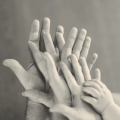Childhood trauma affects us in numerous ways and when it’s not well processed, it gets entrapped within our mind, soul and body. Opening up about childhood trauma is difficult, because many times we simply suppress our emotions or just live in denial. However we need to process it to live a healthier and happier life. Though this process of healing from childhood trauma is extremely difficult, but nonetheless it’s very fruitful and will make you at peace with yourself and your past.
In this article, I am listing a few practical tips that will definitely help you in this journey
of healing from trauma.
Acceptance
The first step to healing from childhood trauma is acceptance. We often confuse acceptance with ‘giving in’ or we regard it as a passive technique. What we often forget is that acceptance is the first step towards change. It’s an active process, which gives you the courage and strength to transform yourself and make relevant changes to come out of it. Not accepting your childhood trauma would mean living in denial. Though denial appears to be a pretty easy thing to do, it slowly starts eating you inside, it doesn’t make your horrors, your scars, your hurting go away, it simply amplifies it and hollows you up from inside. So, yes that’s definitely harmful. I know it’s hard to accept that something so debilitating happened and you couldn’t do anything.
So here are few tips/steps that’ll help you accept your trauma:
- Be self-aware: Sit down at a quiet place and try being mindful of yourself, most
importantly your body. Try comprehending what all emotions you are experiencing and ponder over some questions:-
i)How the trauma is affecting you ?
ii) What all emotions you are going through, when you’re thinking about your childhood trauma? (Try labeling these emotions)
iii) How do I react to these emotions?
iv) How do you want things to turn out? (Try being specific, write about how you really want to deal with trauma, like I know it’s simply impossible to turn your negative emotions into a positive one but yes, those unhealthy negative emotions can definitely be turned into healthy negative emotions! Yes there’s this distinction also! Will explain it later in the article) - Don’t downsize your emotions: We often see things as we want them to be, but not as they really are. While accepting, it’s important you see things as they really are. Don’t try to cover up your pain or the effects of trauma. Each one of us have the right to feel things as they are. If after 8 or 10 years, it still incredibly pains, let it be. You have the right to feel things.
Emotional regulation
Coming back to the healthy and unhealthy negative emotions. First, be self-aware what all emotions you feel or react with when thinking about trauma, then accept that it’s okay if you can’t change these negative emotions into positive ones, and then promise yourself that you’ll definitely transform these unhealthy negative emotions into healthy negative emotions. Now, what are these unhealthy and healthy negative emotions ? REBT Founder ‘Albert Ellis’ gave this concept where he defined:
● Unhealthy negative emotions as an irrational emotional response to an adverse event, that halts the process of acceptance, interfere with an individual’s ability to move past things and move on in life and most often than not result in inaction and destructive
behavior. Some examples include anxiety, depression, anger, guilt, shame etc.
● Healthy negative emotions are rational emotional response to an adverse event, which helps individual to accept and change the situation. Some examples include sadness, healthy anger or annoyance, disappointment, regret etc.
The process of changing your unhealthy negative emotions into healthy positive emotions might not be very comfortable or easy, but it would definitely be worth your time and efforts. Imagine transformation in yourself, when you get rid of that unbearable anxiety and instead now feel concerned. Try referring to a CBT or RECBT therapist for your journey of unhealthy to healthy negative emotions.
Create a social support system
“What happens when people open their hearts? They feel better. “- Haruki Murakami
A lot of times, childhood trauma forces us to isolate ourselves from others or become avoidant of relationships in general (as mentioned in my previous article). It can have an ever lasting effect on how we perceive and manage relationships. However, it’s important to remember that all of us are dependent on each other, as Lewin said
‘People need people’, so yes, go ahead, take a leap of faith and start taking steps in order to connect/reconnect with friends, co-workers or family members.
Take baby steps, try reconnecting to an old friend or have a simple conversation with a
colleague. You don’t necessarily need to talk about trauma, simply talking to a friend will boost your mood and make you feel a sense of belonging and make you feel loved.
Don’t be afraid to feel vulnerable
Having undergone childhood trauma, makes one afraid to be vulnerable again. Most of the time, people start associating the feelings of helplessness and hopelessness with vulnerability, so much so that, they try to bury down their feelings and hardly open up.
“Vulnerability sounds like truth and feels like courage. Truth and courage aren’t always
comfortable, but they’re never weakness.” – Brené Brown
Being vulnerable is important because it forces you to start being honest with yourself about how you are coping. Now, you need to introspect with yourself what coping mechanisms have you been applying lately ? Are they still working ? Are they in alignment with the type of life you want ?
It’s highly possible that you might be so untrusting of people, that you have developed
self-reliance, to the core where it’s being destructive to yourself as it’s hindering people from entering into your life. Or you might be displacing your anger and frustration by intimidating weak people around you. You might not be aware or maybe just being in denial about these defence mechanisms. However these defence mechanisms are harming you more than giving any strength. So, it’s advisable to introspect yourself and get as brutally honest with yourself.
Don’t be shy to ask for professional help
Facing and resolving your childhood trauma on your own is extremely difficult. Though friends can provide you with immense social support and be a cushion to fall back on, but you certainly would require professional help. And there’s no harm in reaching out to a therapist or a specialist.
Trauma symptoms differ from person to person and there are a lot of therapies which have been proved to be effective in dealing with childhood trauma. Cognitive Behavioral Therapy or CBT and EDMR (Eye Movement Desensitization and Reprocessing) have been proved efficient in dealing with childhood trauma.
Take your time, don’t rush into something. Read about different therapy approaches and then decide what will be beneficial for you and take control of how you want to proceed in this journey of healing.
Having undergone childhood trauma is extremely distressing and devastating and it can have a long term impact on the person, affecting their adulthood relationships, friendships and their progress. However, it’s possible to heal with it, it’s possible to reclaim your power, it’s possible to heal those wounds. Learn how the trauma affected you, observe your symptoms, be self-aware about them and gradually accept them, don’t shy from being vulnerable or ask for professional help. You have the power within you to turn things into your way and don’t let those haunting feelings or negative emotions rule over the power within you.



























No Comments
Leave a comment Cancel